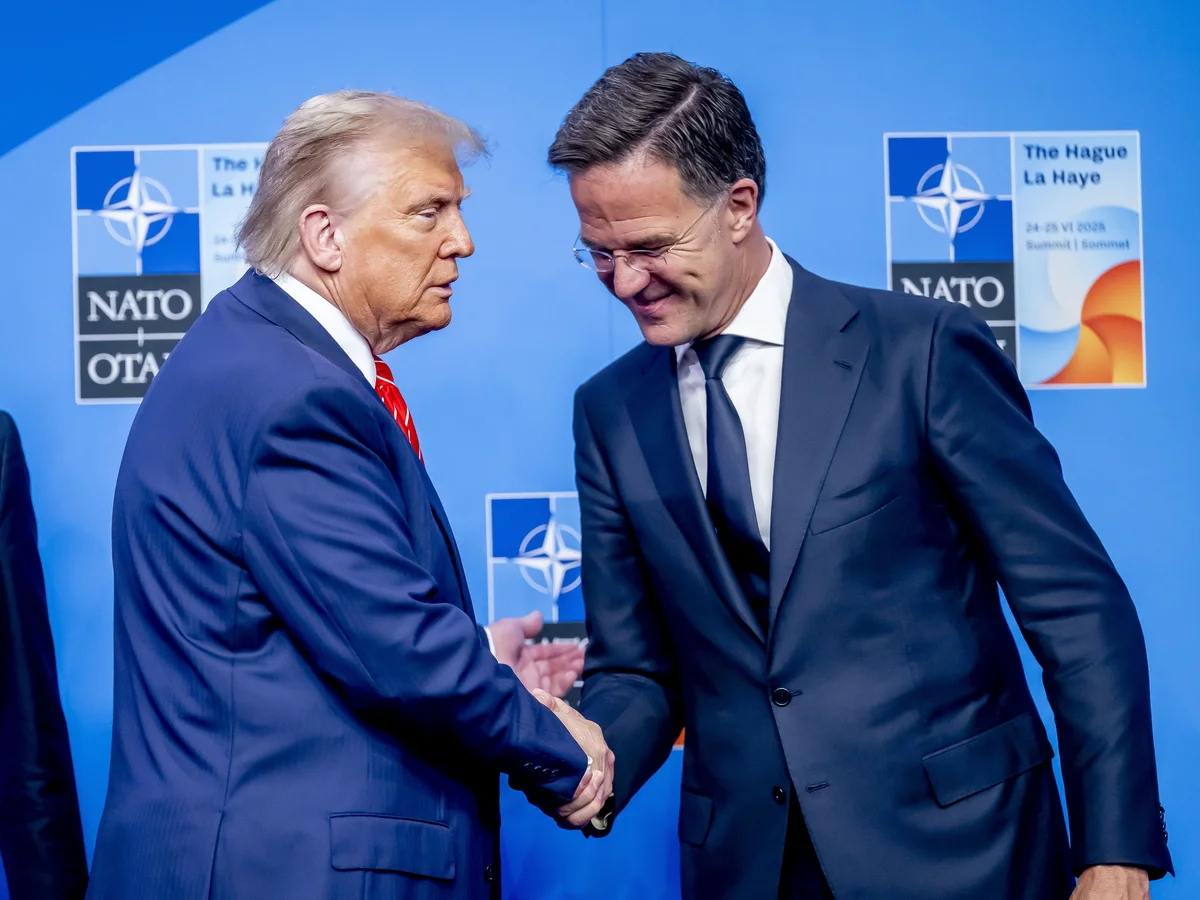Flattery and Foreign Policy: Trump–Rutte Bond Overshadows Historic NATO Defense Pact
Flattery and Foreign Policy: Trump–Rutte Bond Overshadows Historic NATO Defense Pact
By
David Goldfarb
Last updated:
June 26, 2025
First Published:
June 26, 2025

Donald Trump and Mark Rutte shake hands at the Nato summit. Photograph: Robin Utrecht/Shutterstock
This year’s NATO summit in The Hague was expected to be historic—and it delivered, at least on paper. Member nations made a groundbreaking commitment to increase defense spending to 5% of GDP by 2035, more than doubling the current 2% target that has been a longstanding NATO benchmark. But despite this milestone, the media spotlight veered in another direction entirely: the curious and unusually affectionate dynamic between U.S. President Donald Trump and NATO Secretary General Mark Rutte.
The summit was rich in policy implications, but the public discourse was dominated by a moment of rhetorical flair that left many stunned. Rutte, widely respected for his diplomatic finesse as former Dutch Prime Minister, referred to Trump in a moment of levity as “daddy” — a comment that would soon eclipse even the alliance’s most consequential decisions.
A ‘Bromance’ Takes Center Stage
In what became one of the most talked-about interactions of the summit, Rutte lavished praise on Trump both publicly and privately. During a key address, Rutte stated:
“This would not have happened if you were not elected in 2016 and re-elected last year. You deserve all the praise.”
He was referring to Trump’s relentless pressure on NATO allies to boost military budgets, which many credit as the catalyst behind the new 5% target. But the praise didn’t stop there. Rutte also hailed Trump’s response to the Iran-Israel conflict, describing it as a “decisive” act that few global leaders would have dared to make.
Rutte went further during a conversation about Middle Eastern tensions, saying, “And then daddy has to sometimes use strong language to get them to stop,” in reference to Trump’s diplomatic role between Iran and Israel. The comment, though intended humorously, immediately went viral.
Journalists Press for Answers
The peculiar phrasing did not go unnoticed. At a post-summit press conference, Sky News’ Deborah Haynes challenged Rutte on his language and tone:
“Today you called him ‘daddy,’ and you sent a text message to him that was gushing with praise. Isn’t that a bit demeaning?”
Rutte, ever the seasoned diplomat, remained composed and unapologetic. He responded, “It’s a question of taste. He’s a good friend.”
He doubled down on his support for Trump’s leadership, particularly in foreign policy. “Would you ever think that seven or eight nations would commit to this level of defense spending if he hadn’t been re-elected?” Rutte asked.
He also reiterated his view on Iran, citing Trump’s actions as “targeted and effective” in preventing nuclear escalation.
Trump’s Take: “He Likes Me, I Think”
When Haynes posed the same question to Trump, the U.S. president brushed off the awkwardness and embraced the affection.
“He likes me, I think he likes me. If he doesn’t, I’ll let you know,” Trump said with a grin. “The remark was very affectionate.”
Whether or not the tone was appropriate, the exchange humanized two of NATO’s key figures and showed a rare glimpse into the interpersonal dynamics that often shape global policy decisions behind closed doors.
A Summit of Substance, Overshadowed
Despite the spectacle, the NATO summit did accomplish substantial policy shifts:
- A historical agreement to raise defense spending to 5% of each nation’s GDP by 2035.
- Continued support for Ukraine amid Russia’s prolonged invasion.
- Renewed commitments to cybersecurity coordination and defense innovation.
Yet, headlines were dominated not by geopolitics but by the language of personal admiration and informal camaraderie. As NATO faces increasingly complex global threats, the spotlight on such theatrics underscores how much personality politics can shape—and sometimes overshadow—major international milestones.
Final Thoughts
The 2025 NATO summit revealed both strategic evolution and the nuances of diplomatic relationships. While the move to 5% GDP defense spending marks a significant shift in global security policy, it was the Trump–Rutte dynamic—awkward jokes, extravagant praise, and all—that captured public imagination. Whether this relationship will continue to play a pivotal role in future alliance decisions remains to be seen.
Popular articles
Subscribe to unlock premium content
Can Land Ownership Protect Your Future in an AI-Driven World?

Singapore’s Blueprint: How One Nation Engineered Prosperity from Scratch

US Trade Deficit Surges on Obesity Drug Imports While Chinese Rare Earth Magnet Shipments Collapse

Can Land Ownership Protect Your Future in an AI-Driven World?

Singapore’s Blueprint: How One Nation Engineered Prosperity from Scratch

Can Land Ownership Protect Your Future in an AI-Driven World?









